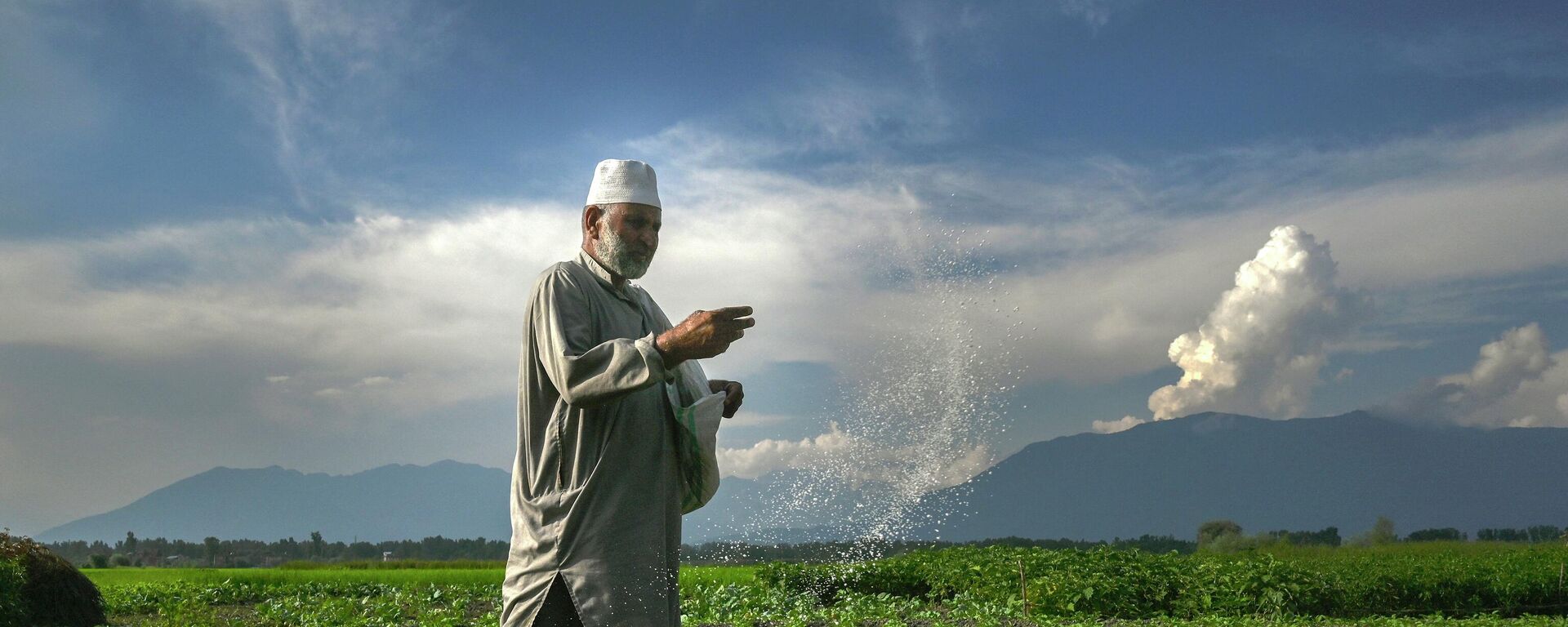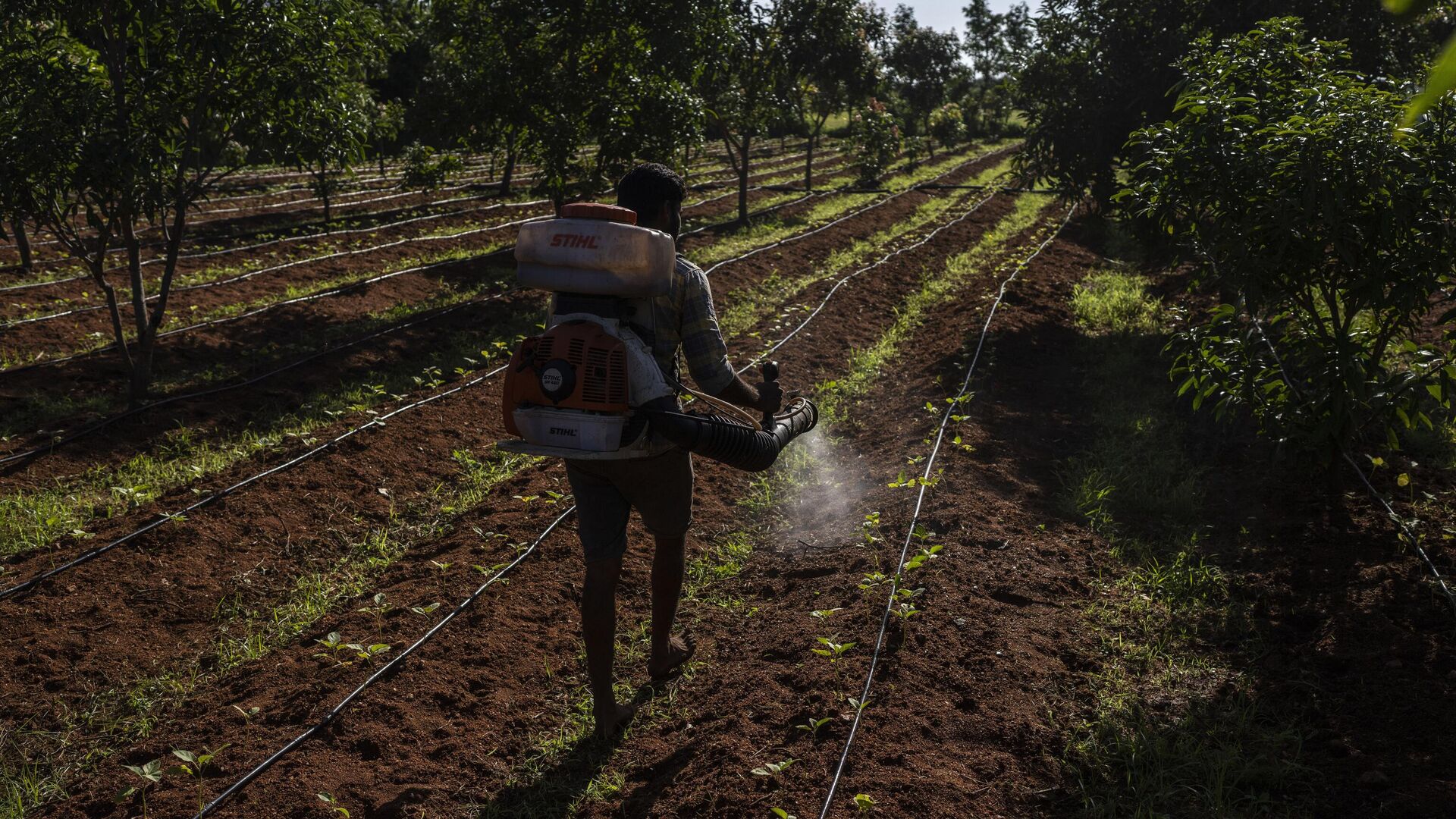https://sputnikglobe.com/20221118/india-says-has-adequate-availability-of-fertilizers-as-winter-crop-season-kicks-in-1104378508.html
India Says Has ‘Adequate’ Availability of Fertilizers as Winter Crop Season Kicks in
India Says Has ‘Adequate’ Availability of Fertilizers as Winter Crop Season Kicks in
Sputnik International
“Rabi” crops in India are sown at the onset of winter and harvested in March-April. Wheat is sown as a rabi crop in northern India. Reported shortages of... 18.11.2022, Sputnik International
2022-11-18T11:33+0000
2022-11-18T11:33+0000
2022-11-18T11:33+0000
india
fertilizer
food crisis
russia
g20
https://cdn1.img.sputnikglobe.com/img/07e6/0b/12/1104379818_0:160:3073:1888_1920x0_80_0_0_eb564466defc953f04c0e41c566e3b9e.jpg
India’s Ministry of Chemicals and Fertilizers on Friday announced that the country has “adequate” availability of fertilizers to meet the requirements of the "rabi" crop season.A statement from the ministry said that enough supplies of urea, diammonium phosphate (DAP), potassium chloride (MOP), and other variants of nitrogen, phosphate, and potassium fertilizers are present in government stocks and at ports for the upcoming crop season.The statement came following media reports about an alleged shortage of fertilizers in the states of Tamil Nadu and Rajasthan.Concerns over the shortage of fertilizers has been voiced on a global level this year, contributing to high food prices, as Western states imposed economic restrictions on Russian fertilizer exports in the wake of Moscow’s special military operation in Ukraine.India has so far largely buffered itself from the global fertilizer crunch with the help of its “time-tested” friend, with import data showing that Moscow has emerged as New Delhi’s third-largest supplier of commodities on the back of rising crude, fertilizers, and coal supplies.The G20 communique at the end of the Bali meeting warned against imposing “export restrictions” on food and fertilizer supplies, which are both inconsistent with the rules of the World Trade Organization (WTO) and further exacerbate the food and fertilizer shortages, particularly in the Global South.
https://sputnikglobe.com/20221102/india-approves-62-billion-fertilizer-subsidy-amid-record-high-global-prices-1102950772.html
russia
Sputnik International
feedback@sputniknews.com
+74956456601
MIA „Rosiya Segodnya“
2022
News
en_EN
Sputnik International
feedback@sputniknews.com
+74956456601
MIA „Rosiya Segodnya“
Sputnik International
feedback@sputniknews.com
+74956456601
MIA „Rosiya Segodnya“
fertilizer crisis in india, food crisis in india, fertilizer crisis in europe, g20 presidency, g20 countries, russian fertilizer, ‘rabi’ crops
fertilizer crisis in india, food crisis in india, fertilizer crisis in europe, g20 presidency, g20 countries, russian fertilizer, ‘rabi’ crops
India Says Has ‘Adequate’ Availability of Fertilizers as Winter Crop Season Kicks in
“Rabi” crops in India are sown at the onset of winter and harvested in March-April. Wheat is sown as a rabi crop in northern India. Reported shortages of fertilizers, combined with high temperatures, affected India’s overall wheat output last summer, prompting the government to restrict exports amid the global food crisis.
India’s Ministry of Chemicals and Fertilizers on Friday announced that the country has “adequate” availability of fertilizers to meet the requirements of the "rabi" crop season.
A statement from the ministry said that enough supplies of urea, diammonium phosphate (DAP), potassium chloride (MOP), and other variants of nitrogen, phosphate, and potassium fertilizers are present in government stocks and at ports for the upcoming crop season.
The statement came following media reports about an alleged shortage of fertilizers in the states of Tamil Nadu and Rajasthan.
“The Government of India is sending fertilizers as per need to all states, and it is the responsibility of respective state governments to ensure availability within the states through proper intra-district and inter-district distribution,” the ministry said.

2 November 2022, 13:57 GMT
Concerns over the shortage of fertilizers has been voiced on a global level this year, contributing to high food prices, as Western states imposed economic restrictions on Russian fertilizer exports in the wake of Moscow’s special military operation in Ukraine.
A Russian Foreign Ministry statement on Thursday said that around 300,000 tons of fertilizers meant for export to developing countries had been held up at European ports.
India has so far largely buffered itself from the global fertilizer crunch with the help of its “time-tested” friend, with
import data showing that Moscow has emerged as New Delhi’s third-largest supplier of commodities on the back of rising crude, fertilizers, and coal supplies.
Indian Prime Minister Narendra Modi warned at the G20 Leaders’ Summit in Bali this week that “today's fertilizer shortage is tomorrow's food crisis, for which the world will not have a solution”.
The G20 communique at the end of the Bali meeting warned against imposing “export restrictions” on food and fertilizer supplies, which are both inconsistent with the rules of the World Trade Organization (WTO) and further exacerbate the food and fertilizer shortages, particularly in the Global South.





